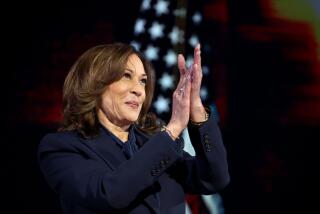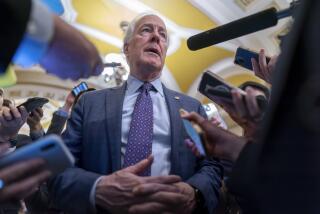Treasury secretary nominee faces tough questions from Senate
WASHINGTON — Republican senators hit Treasury secretary nominee Jacob J. Lew with tough questions about his tenure as a top executive at Citigroup Inc. in the years leading up to the financial crisis, but the former White House chief of staff appeared to avoid any major controversy that could derail his confirmation.
“Frankly, I think you’ve done really well,” Sen. Orrin Hatch (R-Utah), one of the most aggressive questioners, told Lew at the end of his three-hour confirmation hearing Wednesday.
Lew told the Senate Finance Committee that, if confirmed, his priority would be to boost the economic recovery while grappling with the nation’s growing debt. He said he was committed to overhauling the tax code and warned lawmakers to find a way to avoid the automatic spending cuts coming March 1.
“These cuts would impose self-inflicted wounds to the recovery and will put far too many jobs and businesses at risk,” said Lew, 57, who was nominated last month by President Obama to replace Timothy F. Geithner.
Republicans questioned Obama’s commitment to deficit reduction and were critical of his recent call to help offset some of the $85 billion in budget cuts this year by eliminating corporate tax breaks.
Republicans agree the tax code should be overhauled. But they want to use the savings to lower the nation’s 35% corporate tax rate, which is the highest among developed nations, to make the U.S. more competitive.
Hatch and some of his GOP colleagues saved their sharpest questions for Lew’s three years on Wall Street.
They criticized him for not knowing more about the investment strategy of two Citigroup units for which he was chief operating officer from 2006 to 2009.
And Republicans also hit Lew for an investment in the Cayman Islands and a $944,518 payout he received from Citigroup in early 2009, just days before the company obtained an expanded bailout from the federal government’s Troubled Asset Relief Program.
“Were you aware that Citigroup was about to receive a multibillion-dollar federal guarantee when you accepted your bonus?” asked Sen. Charles E. Grassley (R-Iowa).
“Senator, I was aware of the condition of Citi and of the TARP program, yes,” said Lew, who received the payout when he left the company to join the Obama administration.
“OK,” Grassley said. “Explain why it might be morally acceptable to take close to a million dollars out of a company that was functionally insolvent and about to receive a billion dollars of taxpayers’ support?”
Lew defended the payment, which included his 2008 salary of about $350,000 and a bonus.
“I was compensated in a manner consistent with other people who did the kind of work that I did in the industry,” Lew said.
Lew was managing director and chief operating officer at Citi Global Wealth Management from 2006 to 2008 and at Citi Alternative Investments from 2008 to early 2009.
Hatch said that those units participated in proprietary trading and “sales and marketing of risky investments.” He pressed Lew on how much he knew about those activities.
Lew said that his job focused on “broad-ranging management of the business” and that he had limited knowledge about the investments.
“I was not in the business of making investment decisions. I was certainly aware of things that were going on,” Lew said. “I learned a great deal about the financial products. But I wasn’t designing them and I wasn’t opining on them.”
Hatch pressed Lew on what he knew about some specific securities that the Securities and Exchange Commission has alleged Citi misrepresented. But Lew said he did not remember any conversations or emails about those securities.
“Yes, I was aware that there were funds that were in trouble,” he said. “I didn’t have responsibility for the funds themselves, but I was aware that those difficulties were going on.”
Senate Finance Committee Chairman Max Baucus (D-Mont.) and Grassley also questioned Lew about a $56,000 investment he made in a Citigroup private equity fund based in the Cayman Islands.
Obama has been critical of people, including 2012 Republican presidential nominee Mitt Romney, for using Cayman Islands investments to shelter money from U.S. taxes.
Lew said he didn’t know the fund was based in the Cayman Islands. He said he lost money on the investment, which he sold in 2010, and was not aware of any tax benefit.
“I always reported all income. I always paid any taxes that were due,” Lew said.
But Grassley remained critical.
“There’s a certain hypocrisy in what the president says about other taxpayers and then your appointment,” Grassley said.
Lew stressed his history of working with Republicans in Congress on spending deals as head of the Office of Management and Budget in the Obama and Clinton administrations. And he called for Democrats and Republicans to work together to improve the economy.
“In recent years, some have argued that Washington is irrevocably broken, that our government cannot tackle the nation’s most serious problems, that bipartisanship is a thing of the past. I disagree,” Lew said in his prepared remarks. “The truth is, we all share the same goals. We want an economy that is expanding.”
More to Read
Inside the business of entertainment
The Wide Shot brings you news, analysis and insights on everything from streaming wars to production — and what it all means for the future.
You may occasionally receive promotional content from the Los Angeles Times.











